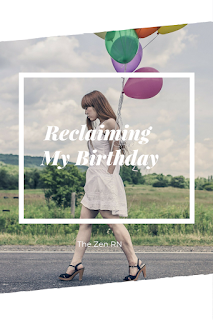When we moved in I was entering my third trimester and wasn't allowed much lifting. I carefully directed the friends and family that were helping us to move in, firmly resolved to place everything where it had been when I lived there-- the silverware placed in the same drawer, the beds and dressers matching up with the lines on the carpeting where there successors had once lain. It felt like moving home.
As the years passed, the sameness of the home seemed as much a burden as a comfort. With the birth of my second child, a beautiful daughter, I struggled with postpartum depression and anxiety. With this new mental health condition also came a resurgence of the PTSD that I had struggled with since being raped at seventeen. Memories began to percolate up, haunting replaying of the violence that long ago night.
This house, my current home and the one of my childhood, became a reminder of the bedroom that I'd come home to the morning after the rape, of the bathtub in which I'd cleaned up the blood in the aftermath. Other ugly childhood memories also resurfaced and the house that I'd spent so many hours carefully making a home became my prison. I was constantly redirecting my thoughts away from the memories that haunted me like demons in the night.
Later that year, I jumped upon plans to remodel our home as if changing paint colors and removing old carpeting could wipe clean my memories. We added an addition on to the home which allowed my husband and I to move out of the room that had been my childhood bedroom and into a new master suite. I felt a sudden and sweeping worry the day that we moved my daughter into that room as if her presence in the same room that held so many wicked memories would taint her in some way. I calmed this worry by choosing one good childhood story per night to tell her as I tucked her in. She came alight in the memories that had happened in this bedroom, in this home and in her own backyard. I came to remember myself, as well.
Over the years, I have taken care to make this home my own. It is nearly unrecognizable from both the outside and inside to those who knew it years ago. We have added many memories within these walls in this years, in the best years of my life as I raise my three amazing children with my loving husband. This home is so full of love that sometimes I wonder if the windows will burst with the pressure of holding it all in.
I am still sometimes haunted by the memories of this home. Just a few weeks ago as I scrubbed my kitchen floor, I was reminded of scrubbing my own vomit off of the same spot the morning after my nearly successful suicide attempt in the weeks following my rape. I was thankful in that moment that we had long ago replaced the worn and stained linoleum with the current hardwood flooring. That fact made it easier for me to redirect my things to better thoughts, like when my son took his first faltering steps on these same floors.
Much like my own body, this house has endured violence and anger, love and compassion. I think of this home in the same way that I imagine my life-- as if it were an old journal, beaten and used but still with many blank pages remaining. I remind myself that what truly matters isn't the old stained pages, unable to be erased, but the crisp pages that await the story waiting to be told there.
If my life were, indeed, a house I wouldn't want my story to be told anywhere else.



















